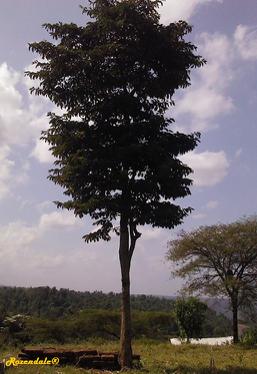Iroko - Milicia excelsa
Description and Uses
Milicia excelsa (Iroko) is a tropical tree from East Africa. It is mainly grown for its timber crops (very long shelflife), but also Other uses include; fuel, mulch, ornamental and timber can be produced. The crop is harvested by total removing. It starts flowering after 10 - 16 years. The first yield will be inapplicable but in its top season there will be a yield of 40 m in 50 years. The shoot is edible. Medical uses include; Array The root contains sucrose (? - unknown). There is Iroko oil extracted by steam distillation from the tree`s wood yielding 7% - 11% oil. The tree`s wood is called iroko and has a density of 550 - 750 kg/m³. Regarding firewood production the tree`s growing speed is fast, its energetic value is 4400 ckal/kg and the wood`s drying speed is fast; for firewood production it is not ideal. After 50 years the tree can be totally removed as it reached its commercial and ecological goal. Milicia excelsa has a lifespan of 400 years.
Environmental limitations
The tree is 50 meters tall. It is fast growing and tolerates not less light than partial shade. Milicia excelsa has a deep root-system and forms symbiotic relations it has symbiotic associations with the Glomus intraradices fungus. (endo-mycorrhiza). It is able to fix nitrogen with Microbacteriaceae bacteria. The tree`s flower-morphology is dioecious and is pollinated by wind. Milicia excelsa is evergreen and not allelopathic and has no thorns.
Milicia excelsa thrives in an altitude of 0 to 1600 meters above sea-level (tropical). The minimum temperature is -1°C and optimally between 21 - 35°C. The optimal rainfall is 1750 mm/year. Without irrigation the annual rainfall should be between 650 - 2200 mm (L/m²). The optimal soil-pH is between 6.0 - 7.0 in a soil texture of sand. To salt it is intolerant to wind intolerant and to fire intolerant.
Pests and Diseases
is susceptible to Phytolyma lata as pest and there are no significant diseases diseases.
Seed Propagation
Seeds are orthodox and can be stored for 1 months. There are approximative 475000 seeds/kg. The seeds can be propagated as followed: (1) Store harvested seeds dry at room temperature, (3) Remove the seeds from cold to a permanent warm temperature., (3) Seeds germinate above ground (epigeous)






